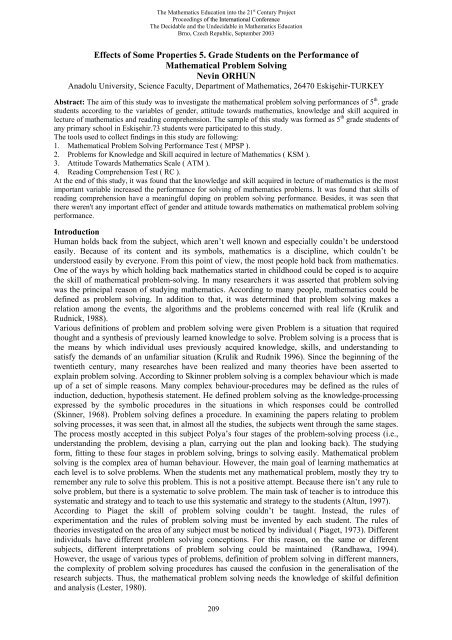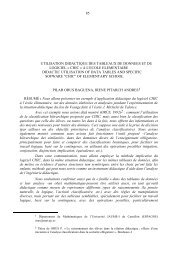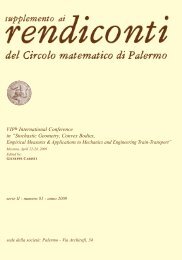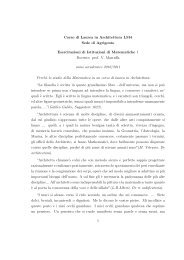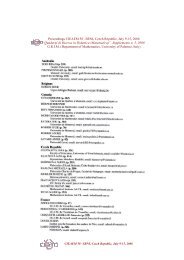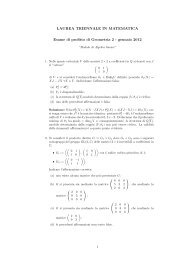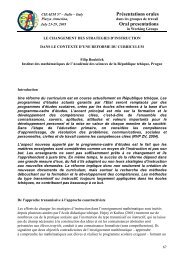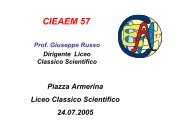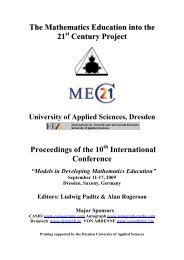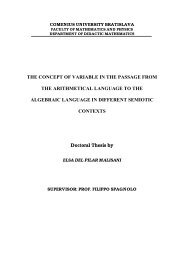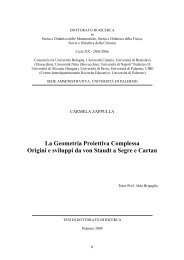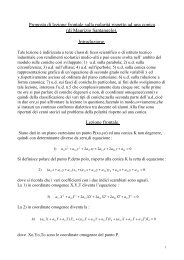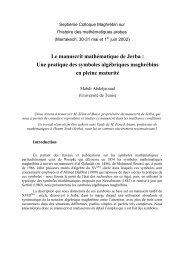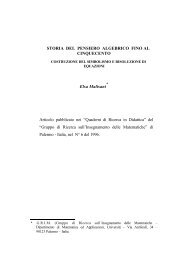Grade Students on the Performance of Mathematical Problem ...
Grade Students on the Performance of Mathematical Problem ...
Grade Students on the Performance of Mathematical Problem ...
You also want an ePaper? Increase the reach of your titles
YUMPU automatically turns print PDFs into web optimized ePapers that Google loves.
The Ma<strong>the</strong>matics Educati<strong>on</strong> into <strong>the</strong> 21 st Century Project<br />
Proceedings <strong>of</strong> <strong>the</strong> Internati<strong>on</strong>al C<strong>on</strong>ference<br />
The Decidable and <strong>the</strong> Undecidable in Ma<strong>the</strong>matics Educati<strong>on</strong><br />
Brno, Czech Republic, September 2003<br />
Effects <strong>of</strong> Some Properties 5. <str<strong>on</strong>g>Grade</str<strong>on</strong>g> <str<strong>on</strong>g>Students</str<strong>on</strong>g> <strong>on</strong> <strong>the</strong> <strong>Performance</strong> <strong>of</strong><br />
Ma<strong>the</strong>matical <strong>Problem</strong> Solving<br />
Nevin ORHUN<br />
Anadolu University, Science Faculty, Department <strong>of</strong> Ma<strong>the</strong>matics, 26470 Eskişehir-TURKEY<br />
Abstract: The aim <strong>of</strong> this study was to investigate <strong>the</strong> ma<strong>the</strong>matical problem solving performances <strong>of</strong> 5 th . grade<br />
students according to <strong>the</strong> variables <strong>of</strong> gender, attitude towards ma<strong>the</strong>matics, knowledge and skill acquired in<br />
lecture <strong>of</strong> ma<strong>the</strong>matics and reading comprehensi<strong>on</strong>. The sample <strong>of</strong> this study was formed as 5 th grade students <strong>of</strong><br />
any primary school in Eskişehir.73 students were participated to this study.<br />
The tools used to collect findings in this study are following:<br />
1. Ma<strong>the</strong>matical <strong>Problem</strong> Solving <strong>Performance</strong> Test ( MPSP ).<br />
2. <strong>Problem</strong>s for Knowledge and Skill acquired in lecture <strong>of</strong> Ma<strong>the</strong>matics ( KSM ).<br />
3. Attitude Towards Ma<strong>the</strong>matics Scale ( ATM ).<br />
4. Reading Comprehensi<strong>on</strong> Test ( RC ).<br />
At <strong>the</strong> end <strong>of</strong> this study, it was found that <strong>the</strong> knowledge and skill acquired in lecture <strong>of</strong> ma<strong>the</strong>matics is <strong>the</strong> most<br />
important variable increased <strong>the</strong> performance for solving <strong>of</strong> ma<strong>the</strong>matics problems. It was found that skills <strong>of</strong><br />
reading comprehensi<strong>on</strong> have a meaningful doping <strong>on</strong> problem solving performance. Besides, it was seen that<br />
<strong>the</strong>re weren't any important effect <strong>of</strong> gender and attitude towards ma<strong>the</strong>matics <strong>on</strong> ma<strong>the</strong>matical problem solving<br />
performance.<br />
Introducti<strong>on</strong><br />
Human holds back from <strong>the</strong> subject, which aren’t well known and especially couldn’t be understood<br />
easily. Because <strong>of</strong> its c<strong>on</strong>tent and its symbols, ma<strong>the</strong>matics is a discipline, which couldn’t be<br />
understood easily by every<strong>on</strong>e. From this point <strong>of</strong> view, <strong>the</strong> most people hold back from ma<strong>the</strong>matics.<br />
One <strong>of</strong> <strong>the</strong> ways by which holding back ma<strong>the</strong>matics started in childhood could be coped is to acquire<br />
<strong>the</strong> skill <strong>of</strong> ma<strong>the</strong>matical problem-solving. In many researchers it was asserted that problem solving<br />
was <strong>the</strong> principal reas<strong>on</strong> <strong>of</strong> studying ma<strong>the</strong>matics. According to many people, ma<strong>the</strong>matics could be<br />
defined as problem solving. In additi<strong>on</strong> to that, it was determined that problem solving makes a<br />
relati<strong>on</strong> am<strong>on</strong>g <strong>the</strong> events, <strong>the</strong> algorithms and <strong>the</strong> problems c<strong>on</strong>cerned with real life (Krulik and<br />
Rudnick, 1988).<br />
Various definiti<strong>on</strong>s <strong>of</strong> problem and problem solving were given <strong>Problem</strong> is a situati<strong>on</strong> that required<br />
thought and a syn<strong>the</strong>sis <strong>of</strong> previously learned knowledge to solve. <strong>Problem</strong> solving is a process that is<br />
<strong>the</strong> means by which individual uses previously acquired knowledge, skills, and understanding to<br />
satisfy <strong>the</strong> demands <strong>of</strong> an unfamiliar situati<strong>on</strong> (Krulik and Rudnik 1996). Since <strong>the</strong> beginning <strong>of</strong> <strong>the</strong><br />
twentieth century, many researches have been realized and many <strong>the</strong>ories have been asserted to<br />
explain problem solving. According to Skinner problem solving is a complex behaviour which is made<br />
up <strong>of</strong> a set <strong>of</strong> simple reas<strong>on</strong>s. Many complex behaviour-procedures may be defined as <strong>the</strong> rules <strong>of</strong><br />
inducti<strong>on</strong>, deducti<strong>on</strong>, hypo<strong>the</strong>sis statement. He defined problem solving as <strong>the</strong> knowledge-processing<br />
expressed by <strong>the</strong> symbolic procedures in <strong>the</strong> situati<strong>on</strong>s in which resp<strong>on</strong>ses could be c<strong>on</strong>trolled<br />
(Skinner, 1968). <strong>Problem</strong> solving defines a procedure. In examining <strong>the</strong> papers relating to problem<br />
solving processes, it was seen that, in almost all <strong>the</strong> studies, <strong>the</strong> subjects went through <strong>the</strong> same stages.<br />
The process mostly accepted in this subject Polya’s four stages <strong>of</strong> <strong>the</strong> problem-solving process (i.e.,<br />
understanding <strong>the</strong> problem, devising a plan, carrying out <strong>the</strong> plan and looking back). The studying<br />
form, fitting to <strong>the</strong>se four stages in problem solving, brings to solving easily. Ma<strong>the</strong>matical problem<br />
solving is <strong>the</strong> complex area <strong>of</strong> human behaviour. However, <strong>the</strong> main goal <strong>of</strong> learning ma<strong>the</strong>matics at<br />
each level is to solve problems. When <strong>the</strong> students met any ma<strong>the</strong>matical problem, mostly <strong>the</strong>y try to<br />
remember any rule to solve this problem. This is not a positive attempt. Because <strong>the</strong>re isn’t any rule to<br />
solve problem, but <strong>the</strong>re is a systematic to solve problem. The main task <strong>of</strong> teacher is to introduce this<br />
systematic and strategy and to teach to use this systematic and strategy to <strong>the</strong> students (Altun, 1997).<br />
According to Piaget <strong>the</strong> skill <strong>of</strong> problem solving couldn’t be taught. Instead, <strong>the</strong> rules <strong>of</strong><br />
experimentati<strong>on</strong> and <strong>the</strong> rules <strong>of</strong> problem solving must be invented by each student. The rules <strong>of</strong><br />
<strong>the</strong>ories investigated <strong>on</strong> <strong>the</strong> area <strong>of</strong> any subject must be noticed by individual ( Piaget, 1973). Different<br />
individuals have different problem solving c<strong>on</strong>cepti<strong>on</strong>s. For this reas<strong>on</strong>, <strong>on</strong> <strong>the</strong> same or different<br />
subjects, different interpretati<strong>on</strong>s <strong>of</strong> problem solving could be maintained (Randhawa, 1994).<br />
However, <strong>the</strong> usage <strong>of</strong> various types <strong>of</strong> problems, definiti<strong>on</strong> <strong>of</strong> problem solving in different manners,<br />
<strong>the</strong> complexity <strong>of</strong> problem solving procedures has caused <strong>the</strong> c<strong>on</strong>fusi<strong>on</strong> in <strong>the</strong> generalisati<strong>on</strong> <strong>of</strong> <strong>the</strong><br />
research subjects. Thus, <strong>the</strong> ma<strong>the</strong>matical problem solving needs <strong>the</strong> knowledge <strong>of</strong> skilful definiti<strong>on</strong><br />
and analysis (Lester, 1980).<br />
209
The Ma<strong>the</strong>matics Educati<strong>on</strong> into <strong>the</strong> 21 st Century Project<br />
Proceedings <strong>of</strong> <strong>the</strong> Internati<strong>on</strong>al C<strong>on</strong>ference<br />
The Decidable and <strong>the</strong> Undecidable in Ma<strong>the</strong>matics Educati<strong>on</strong><br />
Brno, Czech Republic, September 2003<br />
Aiken found that <strong>the</strong>re is an important relati<strong>on</strong>ship between problem solving and <strong>the</strong> skill <strong>of</strong> reading<br />
comprehensi<strong>on</strong>. Reading ability has an important role <strong>on</strong> <strong>the</strong> definiti<strong>on</strong> <strong>of</strong> problem solving ( Aiken,<br />
1972).In <strong>the</strong> solving <strong>of</strong> verbal problems, <strong>the</strong> relati<strong>on</strong>ship between reading comprehensi<strong>on</strong> ability and<br />
arithmetic computati<strong>on</strong> ability was investigated by Glynn According to <strong>the</strong> results <strong>of</strong> this study, while<br />
<strong>the</strong> students’ reading abilities was increased, <strong>the</strong> time spent to set up and solve problems was<br />
decreased (Glynn, 1982).<br />
Gender differences in ma<strong>the</strong>matics have been discoursed about educati<strong>on</strong>al equity issues. Starting in<br />
first grade <strong>the</strong>re were str<strong>on</strong>g and c<strong>on</strong>sistent gender differences in <strong>the</strong> strategies used to solve problems.<br />
Girls tended to use more c<strong>on</strong>crete strategies and boys tended to use more abstract strategies. In third<br />
grade, <strong>the</strong> girls used more standard algorithms than did <strong>the</strong> boys (Fennema, E, et al. 1998). Hyde,<br />
Fennema, Lam<strong>on</strong> investigated gender difference in ma<strong>the</strong>matics performance (Hyde et al. 1990). They<br />
c<strong>on</strong>cluded that boys perform better <strong>on</strong> ma<strong>the</strong>matics test and complex problem solving than girls do.<br />
On <strong>the</strong> c<strong>on</strong>trary, girls showed superiority in computati<strong>on</strong> in elementary school and middle school.<br />
There were no gender differences in problem solving in elementary or middle school; differences<br />
favouring boys emerged in high school and in college. Gallagher investigated gender differences in<br />
ma<strong>the</strong>matical problem solving performances (Gallager, 2000). He found that boys were more able to<br />
use various strategies than girls. Major gender differences in performance d<strong>on</strong>’t appear until in<br />
adolescence, and <strong>the</strong>y are exhibited <strong>on</strong> tasks <strong>of</strong> multistep problem solving (Gallagher, and De Lisi,<br />
1994). Beller and Galli investigated <strong>the</strong> gender effect <strong>on</strong> problem solving. They have found that boys’<br />
performances were better than girls and <strong>the</strong>re was a correlati<strong>on</strong> between gender effects voluminous<br />
and hard item in boy’s favour (Beller and Galli, 2000).<br />
The relati<strong>on</strong>ship between ma<strong>the</strong>matical problem solving performance and <strong>the</strong> organisati<strong>on</strong> <strong>of</strong> students’<br />
knowledge were investigated by Laws<strong>on</strong> and Chinnapan They have stated that <strong>the</strong> dispositi<strong>on</strong> <strong>of</strong><br />
students’ knowledge is associated with better problem solving performance (Laws<strong>on</strong> and Chinnapan,<br />
2000). Davenport and Howe stated that, in ma<strong>the</strong>matical problem solving children perform<br />
c<strong>on</strong>sistently better when using back-up strategies to solve a problem, e.g. using fingers when adding or<br />
subtracting, than when using procedural informati<strong>on</strong>. Because <strong>of</strong> <strong>the</strong>re is <strong>the</strong> need to find some way <strong>of</strong><br />
tackling <strong>the</strong> <strong>on</strong>going problem <strong>of</strong> linking <strong>the</strong> c<strong>on</strong>ceptual and procedural comp<strong>on</strong>ents <strong>of</strong> ma<strong>the</strong>matical<br />
problem solving (Davenport and Howe, 1999). Penelope, Carpenter, Fenneme showed that <strong>the</strong><br />
significant positive relati<strong>on</strong>ships between teachers’ knowledge <strong>of</strong> students’ knowledge and students’<br />
ma<strong>the</strong>matics problem-solving achievement (Penelope, et al. 1989). Some researchers investigated <strong>the</strong><br />
utilizati<strong>on</strong> <strong>of</strong> problem solving strategies <strong>of</strong> teachers. There was an important relati<strong>on</strong>ship am<strong>on</strong>g<br />
teachers’ attitudes towards ma<strong>the</strong>matics and teachers’ attitudes towards problem solving and <strong>the</strong>ir<br />
ma<strong>the</strong>matical background. Some teachers suppose that <strong>the</strong> problem solving is part <strong>of</strong> <strong>the</strong> learning<br />
process. According to many teachers, students’ development <strong>of</strong> ma<strong>the</strong>matical problem solving is <strong>the</strong><br />
main subject <strong>of</strong> learning (Sch<strong>of</strong>eld,1992) (Grouws, and Cramer,1989 ).<br />
<strong>Problem</strong> What are <strong>the</strong> effects <strong>of</strong> gender, attitude towards ma<strong>the</strong>matics, knowledge-skill acquired in lecture <strong>of</strong><br />
ma<strong>the</strong>matics, and reading comprehensi<strong>on</strong> <strong>on</strong> <strong>the</strong> ma<strong>the</strong>matical problem solving performance.<br />
Subject <strong>of</strong> <strong>the</strong> Study The subjects <strong>of</strong> <strong>the</strong> present study c<strong>on</strong>sisted <strong>of</strong> 73 fifth grade students in<br />
Primary School in Eskişehir. The study was carried out during 2002-2003 academic year.<br />
Measuring Instruments In this study, <strong>the</strong> following measuring instruments were used:<br />
1. Ma<strong>the</strong>matical <strong>Problem</strong> Solving <strong>Performance</strong> Test ( MPSP ).<br />
2. <strong>Problem</strong>s for Knowledge and Skill acquired in lecture <strong>of</strong> Ma<strong>the</strong>matics ( KSM ).<br />
3. Attitude Towards Ma<strong>the</strong>matics Scale ( ATM ).<br />
4. Reading Comprehensi<strong>on</strong> Test ( RC ).<br />
Ma<strong>the</strong>matical <strong>Problem</strong> Solving <strong>Performance</strong> Test ( MPSP ) and Reading Comprehensi<strong>on</strong> Test ( RC )<br />
was developed by selecting <strong>the</strong> items included in <strong>the</strong> 1995,1996, 1997 Anadolu High School Entrance<br />
Examinati<strong>on</strong>s. The purpose <strong>of</strong> <strong>the</strong> MPSP was to assess <strong>the</strong> use <strong>of</strong> ma<strong>the</strong>matical problem solving skills<br />
by <strong>the</strong> subjects. MPSP c<strong>on</strong>sisted <strong>of</strong> 20 items. The purpose <strong>of</strong> <strong>the</strong> RC measured subjects’ ability to<br />
comprehend written material. RC c<strong>on</strong>sisted <strong>of</strong> 20 multiple-choice items. <strong>Problem</strong>s for knowledge-skill<br />
acquired in lecture <strong>of</strong> ma<strong>the</strong>matics (KSM) was prepared by <strong>the</strong> researcher. The problems were created<br />
to c<strong>on</strong>form in detail with <strong>the</strong> curriculum for Primary 5. The topic areas covered by <strong>the</strong> problems were<br />
m<strong>on</strong>ey, time, weight, and distance. Besides, <strong>the</strong> ma<strong>the</strong>matical operati<strong>on</strong>s were also paid to <strong>the</strong><br />
structure <strong>of</strong> <strong>the</strong> problems. The purpose <strong>of</strong> <strong>the</strong> KSM was to assess <strong>the</strong> use <strong>of</strong> knowledge and skills by<br />
<strong>the</strong> subjects in <strong>the</strong> elementary school curriculum. KSM c<strong>on</strong>sisted <strong>of</strong> 20 open-ended questi<strong>on</strong>s. Attitude<br />
Towards Ma<strong>the</strong>matics (ATM)was developed by Aşkar (1986 ). ATM c<strong>on</strong>sisted <strong>of</strong> 20 likert-type items.<br />
210
The Ma<strong>the</strong>matics Educati<strong>on</strong> into <strong>the</strong> 21 st Century Project<br />
Proceedings <strong>of</strong> <strong>the</strong> Internati<strong>on</strong>al C<strong>on</strong>ference<br />
The Decidable and <strong>the</strong> Undecidable in Ma<strong>the</strong>matics Educati<strong>on</strong><br />
Brno, Czech Republic, September 2003<br />
Results Linear regressi<strong>on</strong> analysis was used to investigate <strong>the</strong> effects <strong>of</strong> <strong>the</strong> variables gender (G),<br />
attitude towards ma<strong>the</strong>matics (ATM), knowledge-skill acquired in lecture <strong>of</strong> ma<strong>the</strong>matics (KSM), and<br />
reading comprehensi<strong>on</strong> (RC) to <strong>the</strong> ma<strong>the</strong>matical problem solving performances (MPSP)<br />
Table I. Results <strong>of</strong> regressi<strong>on</strong> analysis for MPSP<br />
Model<br />
Unstandardized<br />
Coefficients<br />
t<br />
Sig.<br />
(C<strong>on</strong>stant)<br />
KSM<br />
RC<br />
ATM<br />
G<br />
B<br />
-5,702<br />
0,952<br />
0,679<br />
-0,008<br />
-0,848<br />
Std. Error<br />
2,936<br />
0,254<br />
0,243<br />
0,018<br />
0,546<br />
-1,942<br />
3,747<br />
2,791<br />
-0,463<br />
-1,552<br />
0,061<br />
0,001<br />
0,009<br />
0,647<br />
0,130<br />
The correlati<strong>on</strong> coefficients for each variable are found that:<br />
KSM : 0,952, RC : 0,679 ATM : .- 0,0008 G : - 0,848<br />
The results <strong>of</strong> <strong>the</strong> regressi<strong>on</strong> analysis indicated that KSM and RC are significant to explain MPSP,<br />
o<strong>the</strong>r variables aren’t significant.<br />
According to this results, it can be seen that independent variables KSM (B= 0,952, p= 0,001) and RC<br />
( B = 0,679, p= 0,009 ) significantly affected to MPSP.<br />
Table II . Results <strong>of</strong> regressi<strong>on</strong> analysis for MPSP use scores in KSM and RC<br />
Model<br />
Unstandardized<br />
Coefficients<br />
Std.<br />
B Error t Sig.<br />
(C<strong>on</strong>stant)<br />
KSM<br />
-2,875<br />
1,038<br />
2,293<br />
0,283<br />
-1,254<br />
3,666<br />
0,218<br />
0,001<br />
(C<strong>on</strong>stant)<br />
RC<br />
KSM<br />
-7,847<br />
0,964<br />
0,718<br />
2,620<br />
0,255<br />
0,234<br />
-2,995<br />
3,773<br />
3,068<br />
0,005<br />
0,001<br />
0,004<br />
According to data in Table II <strong>the</strong> following relati<strong>on</strong>s were obtained:<br />
MPSP = - 2,875 + 1, 038 KSM<br />
MPSP = - 7, 847 + 0,964 KSM + 0,718 RC<br />
While <strong>the</strong>re were <strong>on</strong>ly variables KSM and RC, <strong>the</strong> regressi<strong>on</strong> coefficients are found that, 0,964 and<br />
0,718.<br />
Table III. Regressi<strong>on</strong> analysis for all variables.<br />
Model Sum <strong>of</strong> Squares df<br />
Mean<br />
Square F Sig.<br />
Regressi<strong>on</strong><br />
Residual<br />
Total<br />
75,750<br />
83,439<br />
159,189<br />
4<br />
32<br />
36<br />
18,937<br />
2,607<br />
7,263 0,000<br />
According to linear regressi<strong>on</strong> analysis <strong>the</strong> general model isn’t significant.<br />
Discussi<strong>on</strong> and Implicati<strong>on</strong>s:<br />
The main purpose <strong>of</strong> this study were to investigate <strong>the</strong> ma<strong>the</strong>matical problem solving performance <strong>of</strong><br />
fifth grade students according to <strong>the</strong> variables <strong>of</strong> gender, attitude ma<strong>the</strong>matics, knowledge-skill<br />
acquired in lecture <strong>of</strong> ma<strong>the</strong>matics and, reading comprehensi<strong>on</strong>.<br />
211
The Ma<strong>the</strong>matics Educati<strong>on</strong> into <strong>the</strong> 21 st Century Project<br />
Proceedings <strong>of</strong> <strong>the</strong> Internati<strong>on</strong>al C<strong>on</strong>ference<br />
The Decidable and <strong>the</strong> Undecidable in Ma<strong>the</strong>matics Educati<strong>on</strong><br />
Brno, Czech Republic, September 2003<br />
According to <strong>the</strong> results<strong>of</strong> this study, <strong>the</strong> main causes <strong>of</strong> failure to solve problems reliably are not to<br />
apply ma<strong>the</strong>matical knowledge and not to understand <strong>the</strong> problem statement.It is seen that, successful<br />
students applied <strong>the</strong> knowledge and, skill gained in lecture <strong>of</strong> ma<strong>the</strong>matics to new problems.<br />
Therefore, knowledge and, skill are necessary for problem solving and also using various problemsolving<br />
strategies. Generally, in ma<strong>the</strong>matics less<strong>on</strong>s, a particular problem type is taught instead <strong>of</strong><br />
particular soluti<strong>on</strong> strategies. This may prevent students to produce new strategies when a n<strong>on</strong>routine<br />
questi<strong>on</strong> is asked. The problems in KSM are real problems which created to c<strong>on</strong>form in detail with <strong>the</strong><br />
curriculum for Primary 5 that require students to use previously learned principles, rules, and,<br />
informati<strong>on</strong>.<br />
The results showed that, <strong>the</strong>re was significant relati<strong>on</strong> between <strong>the</strong> problem solving skill performances<br />
and knowledge-skill acquired in lecture <strong>of</strong> ma<strong>the</strong>matics. Particularly, knowledge-skill acquired in<br />
lecture <strong>of</strong> ma<strong>the</strong>matics plays important role in to determine <strong>the</strong> problem. Besides, it was found that<br />
skills <strong>of</strong> reading comprehensi<strong>on</strong> have a meaningful doping <strong>on</strong> problem solving performance. It can be<br />
c<strong>on</strong>cluded that students’ knowledge-skill acquired in lecture <strong>of</strong> ma<strong>the</strong>matics and reading<br />
comprehensi<strong>on</strong> ability can be correlated with <strong>the</strong>ir ma<strong>the</strong>matical problem solving performance.On <strong>the</strong><br />
o<strong>the</strong>r hand, as many researchers stated that, <strong>the</strong>re was not significant relati<strong>on</strong>ship between <strong>the</strong> problem<br />
solving performance and, attitude towards ma<strong>the</strong>matics and, gender.<br />
A problem is understood by solving it not by p<strong>on</strong>dering it (Krulik, Rudnik, 1996). Then, to increase<br />
<strong>the</strong> problem solving performances we must teach to <strong>the</strong> student strategies <strong>of</strong> problem solving, instead<br />
<strong>of</strong> problem solving.<br />
References<br />
Aiken.L.W. (1972).Language Factors in Learning Ma<strong>the</strong>matics.Review <strong>of</strong> Educati<strong>on</strong>al Research, 42,3,359-<br />
385.<br />
Altun,M.,(1997). İlköğretimde <strong>Problem</strong> Çözme Öğretimi.Milli Eğitim,26-30<br />
Aşkar, P., (1986). Matematik Dersine Yönelik Tutum Ölçen Likert Tipi Bir Ölçeğin Geliştirilmesi.Eğitim ve<br />
Bilim.31-36.<br />
Beller,M. Gafni,N. (2000).Can Item Format Account for Gender Differences in Ma<strong>the</strong>matics Achievement ?<br />
Sex Roles,42,1-2.<br />
Fennema,E. et.al. (1998).New Perspectives <strong>on</strong> Gender Differences in Ma<strong>the</strong>matics.Educati<strong>on</strong>al Researcher,19-<br />
21, June-July.<br />
Gallagher,A.M.,and De Lisi, R. (1994).Gender Differences in <strong>the</strong> Scholastic Aptitude Test-Ma<strong>the</strong>matics<br />
<strong>Problem</strong> Solving Am<strong>on</strong>g High-Ability <str<strong>on</strong>g>Students</str<strong>on</strong>g>.Journal <strong>of</strong> Educati<strong>on</strong>al Psychology,86,204-211.<br />
Gallagher,A.M.,et al. (2000). Gender Differences in Advanced Ma<strong>the</strong>matical <strong>Problem</strong> Solving. Journal <strong>of</strong><br />
Experimental Psychology,75,165-190.<br />
Glynn, K.D. (1982). Reading Comprehensi<strong>on</strong> Ability and Soluti<strong>on</strong> <strong>of</strong> Aritmetic Word <strong>Problem</strong>s.Dissertati<strong>on</strong><br />
Abstracts Internati<strong>on</strong>al,42, 8, 3524 A.<br />
Hyde, J.S,Fennema,E.,Lam<strong>on</strong>,S.J.(1990) Gender Differences in Ma<strong>the</strong>matics <strong>Performance</strong>: A Meta-<br />
Analysis.Psychological Bulltin,107,2,137-155.<br />
Krulik,S.,Rudnik,J.A. (1996). Assesing Reas<strong>on</strong>ing and <strong>Problem</strong> Solving. A Source Book for Elementary School<br />
Teachers.Mc Tighe,Jay.<br />
Krulik,S.,Rudnik,R.J.. (1988). <strong>Problem</strong> Solving, AHandbook for Elementary School Teachers,Needhem<br />
Heights, MA.: Ally and Bac<strong>on</strong>.<br />
Laws<strong>on</strong>,M.J. and Chinnapan, M. (2000). Knowledge C<strong>on</strong>nectedness in Geometry <strong>Problem</strong> Solving. Journal for<br />
Research in Ma<strong>the</strong>matics Educati<strong>on</strong>,31,1,26-43.<br />
Lester,F.K. (1980). Research <strong>on</strong> Ma<strong>the</strong>matical <strong>Problem</strong> Solving. Journal for Research in Ma<strong>the</strong>matics<br />
Educati<strong>on</strong>,25,6,660-675.<br />
Meier,S.,Hovde,R.,Meier,R. (1996) <strong>Problem</strong> Solving Teachers’ Percepti<strong>on</strong>s C<strong>on</strong>tent Area Models, and<br />
Interdisciplinary C<strong>on</strong>necti<strong>on</strong>s School Science and Ma<strong>the</strong>matics, 96,5,230-237.<br />
Penelope,L.P.,Carpenter,T.,Fenneme,E.(1989).Teachers’ Knowledge <strong>of</strong> <str<strong>on</strong>g>Students</str<strong>on</strong>g>’ Knowledge in Ma<strong>the</strong>matics<br />
<strong>Problem</strong> Solving: Correlati<strong>on</strong>al and Case Analyses.Journal <strong>of</strong> Educati<strong>on</strong>al Psychology,81,4,558-569.<br />
Piaget,J. (1973).To Understand is To Invent: The Future <strong>of</strong> Educati<strong>on</strong>. Theory into Practice, New York:<br />
Macmillan Publishing Company.<br />
Randhawa, B.S. (1994).Theory, Research, and Assessment <strong>of</strong> Ma<strong>the</strong>matical <strong>Problem</strong> Solving.The Alberta<br />
Journal <strong>of</strong> Educati<strong>on</strong>al Research, 40,2,213-231.<br />
Schoenfeld, A.H.(1992).Learning to Think Ma<strong>the</strong>matically: <strong>Problem</strong> Solving, Metacogniti<strong>on</strong>,and Sense Making<br />
in Ma<strong>the</strong>matics.Handbook <strong>of</strong> Research <strong>on</strong> Ma<strong>the</strong>matics. Teaching and Learning, New York Macmillann<br />
Publishing Company.<br />
Skinner,B.F. (1968). The Technology <strong>of</strong> Teaching. New York,MacMillan Publishing Company.<br />
212


